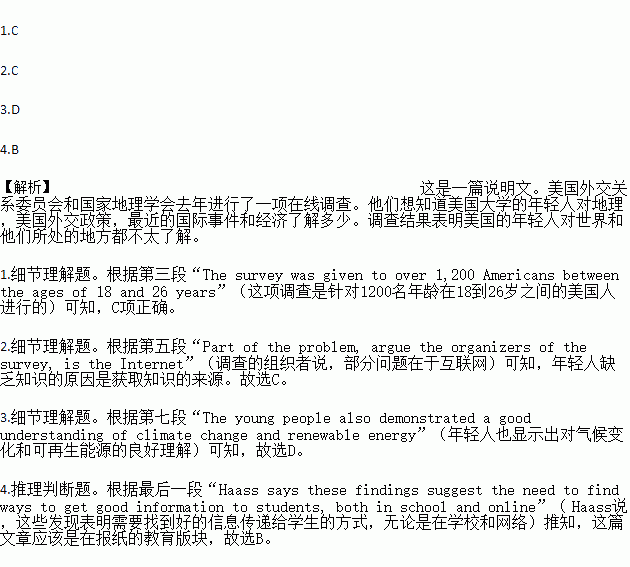题目内容
Young people in the United States do not have a strong understanding of the world and their place in it.
Two US-based groups, the Council on Foreign Relations and the National Geographic Society, conducted an online survey last year. They wanted to know what young people in American colleges knew about geography, U.S. foreign policy, recent international events, and economics.
The survey was given to over 1,200 Americans between the ages of 18 and 26 years. All of them presently attending, or having previously graduated from, a 2- or 4-year college or university.
The average test score, out of 75 total possible answers, was 55 percent. The study identifies a few important problems. For example, only 30 percent knew that the only part of the U.S. government that can declare war is Congress. Only 60% of those taking the survey could identify Brazil on a world map.
Part of the problem, argue the organizers of the survey, is the Internet. They say it is becoming harder to find high-quality information about world events amongst all the fake news and trivia which swamp the web. Forty-three percent of those questioned said they read about the news on Facebook.
Another problem is that most college courses do not require students to learn about international issues. If such information is not required, Richard Haass from the Council on Foreign Relations said, then the United States could have leaders like Gary Johnson. He was a recent presidential candidate who did not know about the Syrian city of Aleppo when a reporter asked him about it.
The survey results were not all bad. The young people also demonstrated a good understanding of climate change and renewable energy. And the majority of them said that international issues were becoming more important to them.
Haass says these findings suggest the need to find ways to get good information to students, both in school and online. To help, the Council on Foreign Relations is creating a new program called CFR Campus, designed to help build knowledge about global issues.
1.What do we know about the survey?
A. The participants were all recent university graduates.
B. It was an online survey conducted by two US universities.
C. It was given to over 1,200 American people aged from 18 to 26.
D. It aimed to find out what the young people know about America.
2.What’s one reason survey organizers give for young people’s lack of knowledge?
A. The poor quality of the US university system.
B. Young people’s unwillingness to travel abroad.
C. The sources from which they get their information.
D. Their lack of interest in knowing more about the world.
3.What topic did the young Americans understand best according to the survey?
A. Government organizations. B. Geographic information.
C. Foreign relations. D. Environmental matters.
4.In which column of a newspaper could we find this article?
A. Economics. B. Education.
C. National Politics. D. Entertainment.


 ng” and “I love you” will warm a coldest heart. Remember that they brought you into this world. Without your parents, we might still wander at an unknown corner in an unknown world. Respect them more and cherish these moments. You can use these moments to learn from them when you're off on your own. It's OK to get angry but angry actions don't help you or your parents. Act calmly, cool off, journal about your feelings, or talk to a friend.3.
ng” and “I love you” will warm a coldest heart. Remember that they brought you into this world. Without your parents, we might still wander at an unknown corner in an unknown world. Respect them more and cherish these moments. You can use these moments to learn from them when you're off on your own. It's OK to get angry but angry actions don't help you or your parents. Act calmly, cool off, journal about your feelings, or talk to a friend.3. nts like watching TV, or go somewhere with them.5.Listen to their old stories and learn from them. You will find they are your teachers in this way or another.
nts like watching TV, or go somewhere with them.5.Listen to their old stories and learn from them. You will find they are your teachers in this way or another.